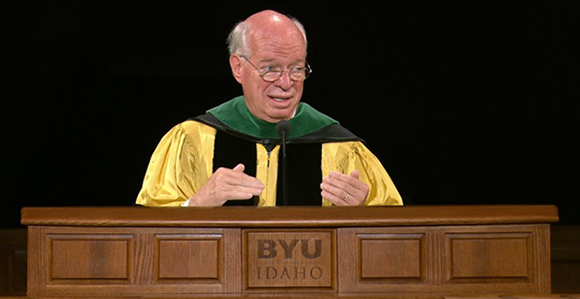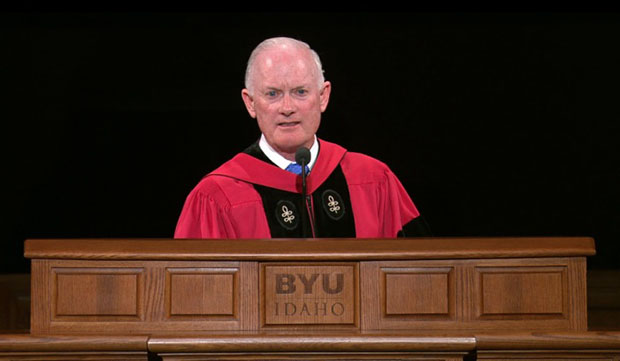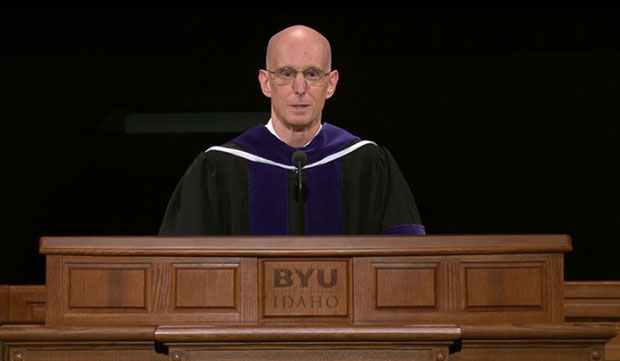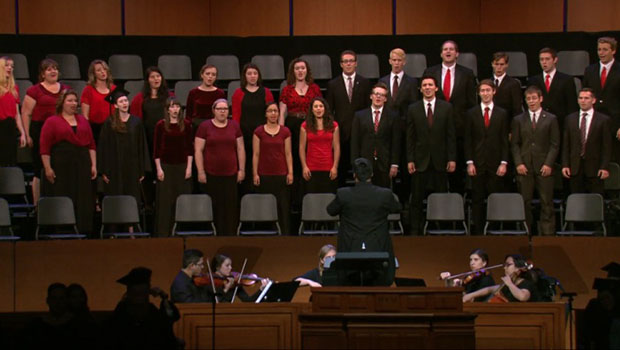Seek to “Please God,” Seventy Encourages BYU–Idaho Graduates
Contributed By Marianne Holman Prescott, Church News staff writer

Elder J. Devn Cornish, General Authority Seventy, speaks during BYU–Idaho commencement exercises on July 18. Photo courtesy of BYU–Idaho.
Article Highlights
- Seeking to please God will guide you through difficult decisions or situations.
- Pleasing God means holding yourself to the high standard that He has set.
“Investments in prestige, position, and pay not only yield diminishing returns, they also tend to crowd out investments in people, places, and puzzles. Priorities must be established and choices made.” —BYU–Idaho President Henry J. Eyring
Related Links
REXBURG, IDAHO
“A person’s decision to do always those things that please God will help direct him or her through virtually every pitfall and snare in life,” Elder J. Devn Cornish, General Authority Seventy, told 2,080 graduates during commencement exercises at Brigham Young University–Idaho on July 18.
A higher standard
“There are so many decisions we must make in life,” Elder Cornish said. “Most of them don’t have lasting or profound consequences, but some of them will change all of eternity for ourselves and others! Moreover, the hard and fast rules are notoriously imprecise at times that we seem to need them most. These two words—please God—can guide most any decision in life in inspired and precise ways.”
Speaking in the BYU–Idaho Center, Elder Cornish encouraged listeners to “please God” by following His standards, for they “are higher than man’s standards.”
Help from above
Elder Cornish told graduates that they may take comfort knowing that Heavenly Father will help them know what pleases Him. “He wants you to please Him, because He really wants to give you all He has,” he said. “He will let you know if you really ask and if you really listen. Admittedly, sometimes He makes us work for an answer so that when He teaches us His will, we will really follow through, but He wants to guide us.”
Elder Cornish added that Heavenly Father, through His Son and through the Holy Ghost, will open doors and magnify a person’s gifts and talents, strengthening a person to become what He wants him or her to become.
“Please don’t misunderstand what this standard entails,” he said. “To please God rarely, if ever, means doing things the easy way, or doing things the way you want to just because it is comfortable.”
To please God, a person must discover and live up to his or her personal gifts and potential, glimpse a vision of what is possible, become who a person is meant to be, as well as realize that every worthwhile thing a person will ever do will derive its meaning in large measure from the blessings it brings into the lives of God’s other children.
Room for everyone
“In all of this, you must beware of competing with or comparing yourself with others,” he said. “It never was nor is it now God’s goal for you to be better than someone else or even to be like someone else. …
“Please understand, we will best ‘please God’ when we do well the part each of us was individually sent to this place on this earth at this time to fulfill. But whatever our part—whether plumber or principal or prophet—the Lord expects us to do it well.”
Elder Cornish reminded listeners that there are no small people or small parts. There are parts played well and parts not played so well, he said.
Choose the difficult path
“Now I would like to give you a promise and a warning before you take these two sentinel words as your guide,” he said. “What our Father desires for each of us is a fulness of the growth, wisdom, blessings to ourselves and others, and joy that this life and the next have to offer. But those things don’t come from taking the easy path.”
A person’s task in life is to be all that God wants him or her to be, and to do all that God wants them to do.
“Those who please God will make a difference in whichever their spheres of influence turn out to be, because they will have integrity, they will be excellent at what they do, and they will be sincerely caring or compassionate toward their associates,” he said. “People with integrity, excellence, and compassion are inspired to set for themselves standards or expectations for their own performance that far exceed those established by their institutions, the Church, or even their families.”
Joining Elder Cornish on the program was Elder Kim B. Clark, General Authority Seventy, Commissioner of the Church Educational System, and former BYU–Idaho president; and BYU–Idaho President Henry J. Eyring. The BYU–Idaho Chamber Singers provided musical selections during the commencement.
An invitation from the prophet
During his remarks, Elder Clark encouraged listeners to follow the counsel of President Thomas S. Monson to read the Book of Mormon every day.
“Tonight, I encourage you to accept and act on this invitation from the Lord’s prophet,” said Elder Clark. “Take this book, the Book of Mormon, into your hands every day. Read it, study it, ponder, and pray about what you learn, every single day.”
Elder Clark said the Book of Mormon was written for people today and was preserved by the hand of the Lord to “speak to your personal life and bless you every day.”

Elder Kim B. Clark, General Authority Seventy and Commissioner of Education for the Church, speaks during BYU–Idaho commencement exercises on July 18. Photo courtesy of BYU–Idaho.
The Three P’s
President Eyring shared the “three p’s for happiness”—people, places, and puzzles.
“As a young man, I thought a lot about prestige, position, and pay,” President Eyring said.
Drawing on experiences in his own life that felt like setbacks, personal trials, and humiliation, President Eyring said it was during those times that he developed “a measure of genuine humility and faith, the kind that comes only through testing.”
He spoke of the dear family and friends that lifted him, along with the places and experiences that brought him happiness.
“Looking back, I now see that prestige, position, and pay are subject to diminishing returns—in other words, for each additional investment made to obtain these tantalizing rewards, the lasting value received in return is less,” he said. “By contrast, my investments in people, places, and puzzles seem to yield greater satisfaction the more I put into them. …
“Investments in prestige, position, and pay not only yield diminishing returns, they also tend to crowd out investments in people, places, and puzzles. Priorities must be established and choices made.”
This year’s graduation class includes men and women earning 1,695 bachelor degrees and 404 associate degrees. Of the graduates, 311 began in the Pathway program.

BYU–Idaho President Henry J. Eyring speaks during BYU–Idaho commencement exercises on July 18. Photo courtesy of BYU–Idaho.

The BYU–Idaho Chamber Singers perform during BYU–Idaho commencement exercises on July 18. Photo courtesy of BYU–Idaho.
